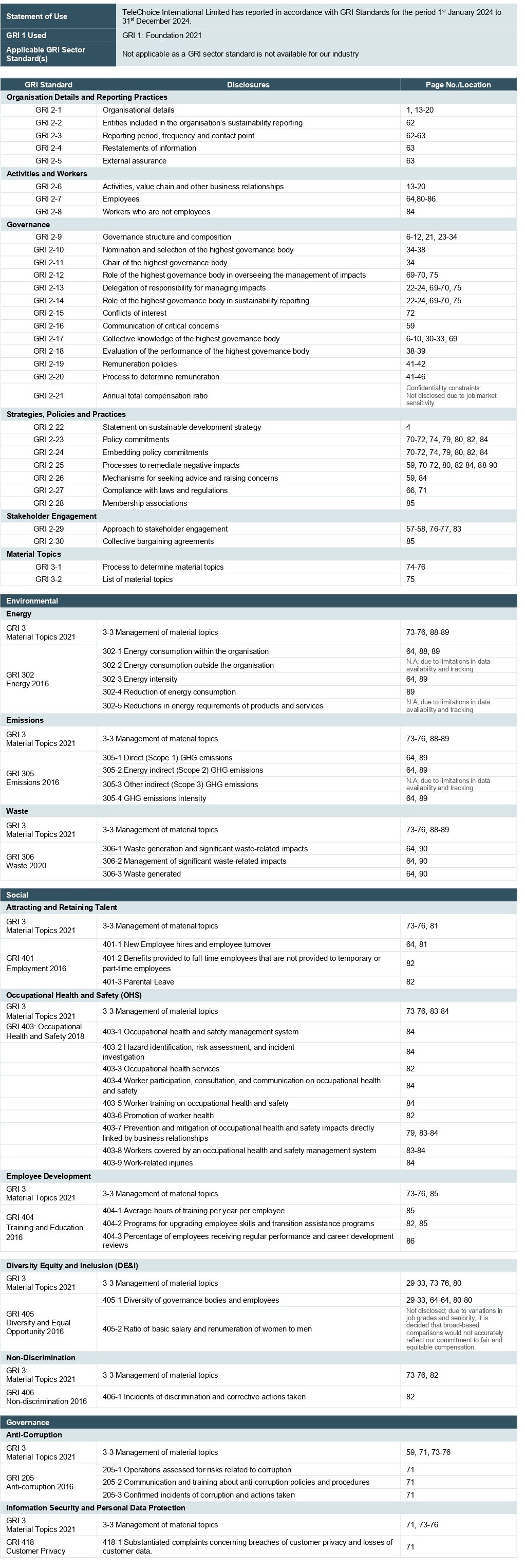About This Report
We are pleased to present TeleChoice’s 8th Sustainability Report. At TeleChoice, we recognise the need for climate action and the critical role businesses play in contributing to Singapore’s and global community’s transition to a low-carbon economy.
TeleChoice’s Board of Directors (the “Board”) collaborates closely with the Management to offer strategic guidance and oversight in managing sustainability risks and opportunities. This includes the identification and governance of material environmental, social, and governance (“ESG”) factors, sustainability-related disclosures, and the integration of sustainability into the Group’s business and strategy. The Board is supported by the Risk & Sustainability Committee (“RSC”), and the Sustainability Management Committee (“SMC”) in the management and monitoring of material ESG topics in the Group’s operations.
We are taking decisive steps to reduce our Scope 1 & 2 emissions by 50% by 2030, as part of our commitment to sustainability, aligning to the Singapore Green Plan 2030 and global Net-Zero by 2050. To ensure our decarbonisation efforts are measured against a transparent and robust benchmark, we have established FY2022 as our baseline year. This has helped us to integrate sustainability as our core business strategy, optimising energy and operational efficiencies, contributing towards a green economy.
Looking ahead, we will continue to accelerate our decarbonisation initiatives by working closely with our industry partners and stakeholders. We will continually enhance our practices, including the pursuit of best practices, and providing transparent progress updates in our sustainability disclosures.
Beyond climate action, sustainability is also about contributing to the development of our employees and the community whom we serve. This year, together with our industry partners, we are proud to have raised S$138,000 through the ‘Walk for Mental Health’ to raise awareness and to contribute to our communities’ overall mental and social well-being, as part of good corporate citizenship. A key aspect of sustainability is attracting, retaining, and engaging good talent, and we are proud to play a proactive role in striving towards a resilient and thriving workplace culture that fosters long-term success from the inside-out.
As we continue in our sustainability journey, the Board and Management of TeleChoice shall remain steadfast in holding sustainability as our core for our stakeholders, creating shared value and towards a brighter, greener future for the generations to come.
The Board has reviewed and endorsed this sustainability report including the material ESG factors covered in the report.
Sustainability Reporting Framework & Practices
Our report adheres to Singapore Exchange Securities Trading Limited (“SGX-ST”) Listing Rules 711A and 711B, on sustainability reporting
requirements, and includes the six primary components: Material ESG Disclosures, Climate-related Disclosures, Policies, Practices and
Performance, Targets, Sustainability Reporting Framework, and a Board Statement.
The report has been prepared in accordance with the GRI Standards given their international recognition as a leading standard for sustainability reporting. This report has been further aligned with the Task Force on Climate-Related Financial Disclosures (TCFD) guidelines and with the relevant United Nations' Sustainable Development Goals (SDGs) to underscore our commitment to sustainable development. TeleChoice reports GHG emissions and related data, including progress against targets using the equity approach across all entities within our reporting scope and boundary outlined in the table below.
Our emissions reporting and emissions factors used have been further aligned with the GHG Protocol for the calculation of Scope 1 emissions, and the Energy Market Authority, Singapore to calculate location-based Scope 2 emissions
Reporting Scope & Boundary
This report covers the TeleChoice’s ESG performance in Singapore and in Malaysia, which will be referred to as the “TeleChoice Group”,
or “the Group” unless specified. This is also the first year in which we included our Malaysian entities’ ESG performance in our sustainability
reporting. The scope of our sustainability reporting and disclosures covers TeleChoice International Limited (199802072R) and its
subsidiaries:

Our focus is on providing sustainability data and insights relevant to all entities within the Group. This includes the performance of our business units across Singapore and other operational regions, ensuring that we maintain transparency and accountability in all areas of our sustainability practices. This report adheres to the guidelines set forth by relevant regulatory bodies and aligns with the principles of responsible corporate governance.
Reporting Principles
We are committed to transparency and accountability in our sustainability reporting. To ensure that our reports are comprehensive,
credible, and comparable, we adhere to the GRI Standards' eight reporting principles: sustainability context, accuracy, balance, clarity,
comparability, completeness, timeliness, and verifiability.
Restatements
Please refer to footnotes in the respective sections on restatements.
Assurance
In FY2023 our internal auditor Ernst and Young Advisory Pte Ltd has performed a review on identified selected ESG reporting process.
In addition, this report has been further reviewed by the Board to ensure quality and control. In compliance with SGX Listing Rules, we
will engage external limited assurance on Scope 1 and 2 emissions for FY2027.
Contact
We welcome stakeholders’ views and questions regarding this report. Contact us at sustainability@telechoice.com.sg.
ESG Performance Summary
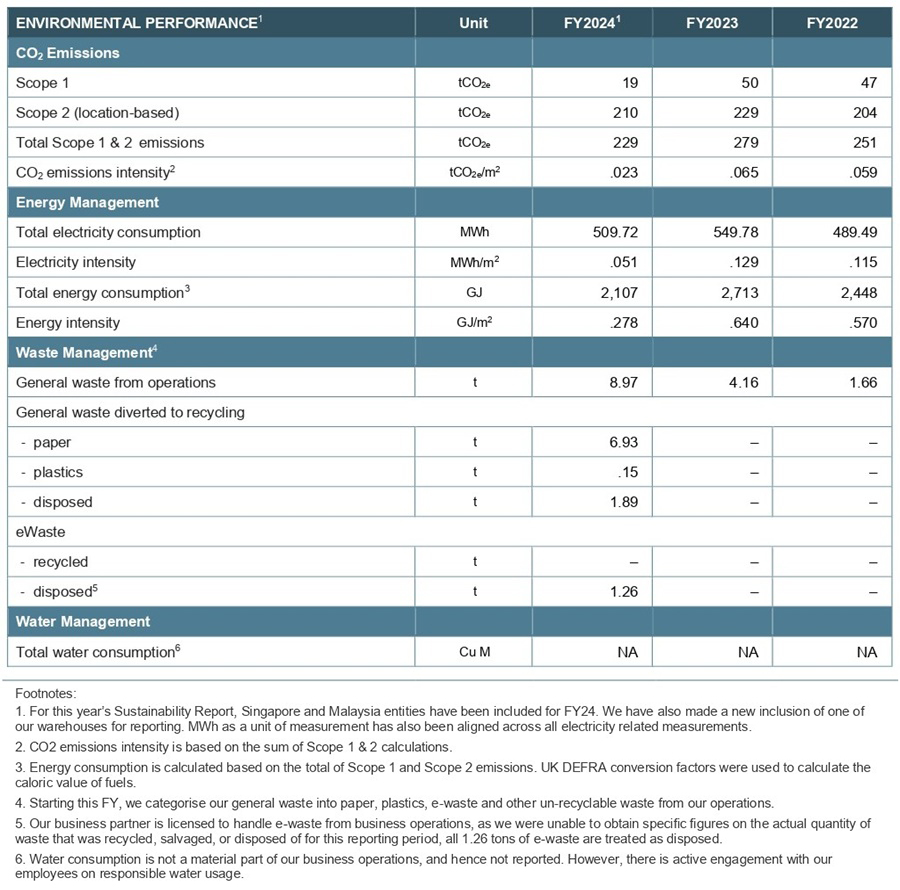
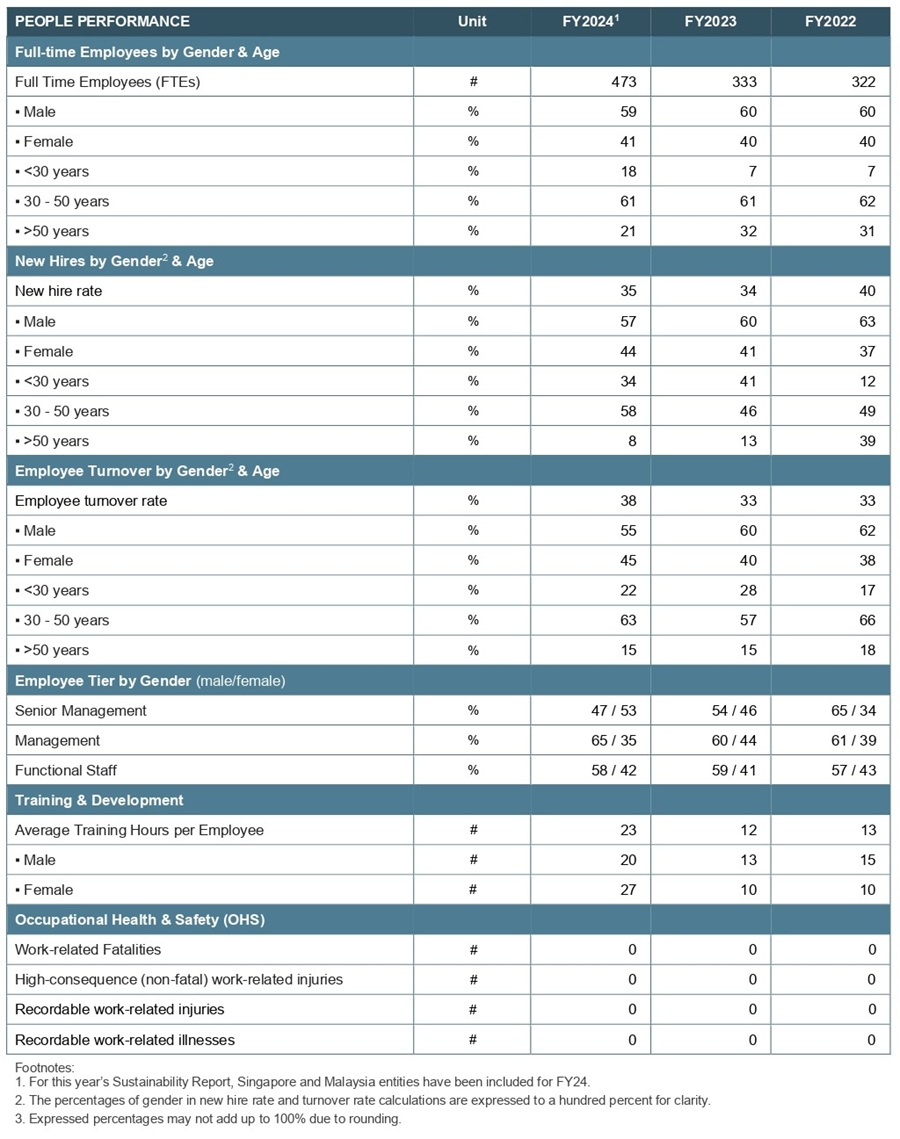
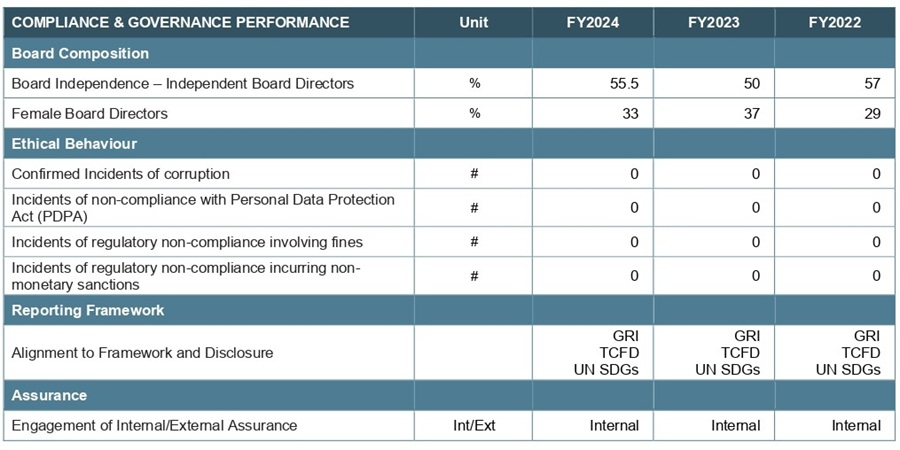
Awards
Our consistent commitment to customer service, quality, and excellence continues to earn the Group several awards and recognition. The following are the awards that TeleChoice International Limited and all its subsidiaries have received in the past three years:
2024
- StarHub – Platinum Shop Top Sales Achiever – 1st Place – Causeway Point outlet
- StarHub – Exclusive Partner Top Sales Achiever – 1st Place – Westgate outlet
- StarHub – Door to Door Top Sales Achiever – 2nd Place – Planet
- StarHub – Platinum Shop Top NPS Achiever – 1st Place – Causeway Point outlet
- StarHub – Exclusive Partner Top NPS Achiever – 1st Place – Westgate outlet
- Nokia – Project Management Champion for Indonesia TI XL Project 2024
- Nokia – Quality Champion for Indonesia TI XL Project
- Nokia – Delivery Champion, TI IOH Category
- Nokia – Delivery Champion NPO IOH Category
- Huawei – Golden Award 2024
- Huawei – Best Subcon Operation Transformation
- Huawei – Best Team Work & Transformation Team
- Huawei – Best Services Excellent O&M (Digital Managed Services)
- Huawei – Certificate of Appreciation for Best Dismantle Material Management H1 2024 Huawei Telkomsel Project
- Avaya – Avaya Edge Diamond Partner 2024
- Audiocodes – Emerging CAI Partner of the Year 2024
- MTech – Million Dollar Club: Top Achiever
- IBM – Top Performing Platinum Business Partner for Power and Storage
- TechData – Top Hardware Partner
2023
- Huawei – Excellent Delivery Award 2023
- Huawei Technology Partner of the Year (Data Storage)
- Huawei – Certificate of Appreciation (Excellent Performance Subcontractor, Project Delivery, Quality and EHS, Huawei IRO XL Project 2023)
- Ericsson – Certificate of Excellence (Indonesia)
- Ericsson – Best Support in MS RAN
- Huawei – Most Valuable TL For IOH Project
- Nokia – Certificate of Appreciation (Indonesia)
- IBM – Top Performing Business Partner 2022 (Power and Storage)
- IBM – Top Performing Business Partner 2022 (Storage)
2022
- MRO Excellent Delivery Award
- Huawei – Best Performance Partner IOH IP RAN Non-Wireless Project
- Huawei – Most Valuable Site Supervisor for IOH Project
- Nokia – Digital Champion for Indonesia XL Project
- Nokia – Project Management Champion for Indonesia IOH Project
- Nokia – Acceptance Champion for Indonesia IOH Project
- Nokia – Delivery Champion (ATP) For Indonesia XL Project
- Nokia – Project Communication Champion for Indonesia IOH Project
- Nokia – Delivery Champion (CO) For Indonesia IOH Project
For a comprehensive listing of awards, please visit our website at https://www.telechoice.com.sg/awards.html
Governance
TeleChoice is committed to high standards of governance, ethics and integrity in conducting its business and managing its material ESG impacts, risks and opportunities in the short, medium and long term.
Board Statement
At TeleChoice, the Board oversees sustainability issues and provides strategic direction for addressing material ESG impacts, risks, and opportunities. The Board has ultimate responsibility for the Group’s sustainability reporting, including its due compliance with the SGX-ST requirements on corporate governance and sustainability reporting.
Sustainability Governance
The Board reviewed and updated the Group’s sustainability governance structure in 2023 and established the RSC. The RSC’s responsibilities include overseeing the Group's sustainability strategy and monitoring of its goals and performance, and review of the sustainability framework, focusing on material ESG matters, considering both global trends and regulatory requirements.
The RSC also ensures ESG factors are integrated into decision-making processes and assesses sustainability-related risks and opportunities over short, medium and long-term, including climate change, climate-related risks and opportunities, resource management, community relations, and employee well-being. In addition to providing regular updates to the Board on the effectiveness of ESG risk management controls, the RSC also oversees the accuracy, transparency, and regulatory compliance of the Group’s sustainability reports and disclosures. All Directors have completed sustainability-related training as stipulated by SGX.
Meetings are held where necessary by the RSC to examine the Group's risk management and sustainability issues, including climaterelated risks and opportunities. It provides updates to the Board on matters of risk management and sustainability, emphasising key risks, emerging trends, and strategies for mitigation.
Annually, the RSC conducts a review to evaluate its performance, effectiveness, and compliance with its terms of reference.
Sustainability Management Committee
The RSC is supported by the SMC, which comprises senior executives led by the President and CEO. The members of the SMC consist of the Chief Financial Officer, Business Unit heads, Vice-President of HR, SR Coordinator and a secretary. The SMC’s responsibilities include the evaluation of climate-related physical and transition risks, their actual or anticipated financial impact on the business in the short, medium and long term. The SMC is also charged with the development, implementation and monitoring of sustainability strategies against the metrics and targets approved by the Board. A Sustainability Reporting Coordinator (”SR Coordinator”) supports the SMC by gathering, verifying, and assessing ESG performance data for reporting purposes. The SMC provides regular updates to the Board through the RSC on progress towards ESG goals and targets and oversees the preparation of sustainability reports for the Board’s review and approval. The structure of the SMC in relation to Board and the RSC is found in the following page.
Management Responsibility
The executive management team at TeleChoice is responsible for implementing the sustainability strategies approved by the Board. This includes regularly updating the Board through the RSC on progress towards ESG goals and targets, as well as overseeing the preparation of sustainability reports for the Board's review and approval.
Sustainability Governance Structure
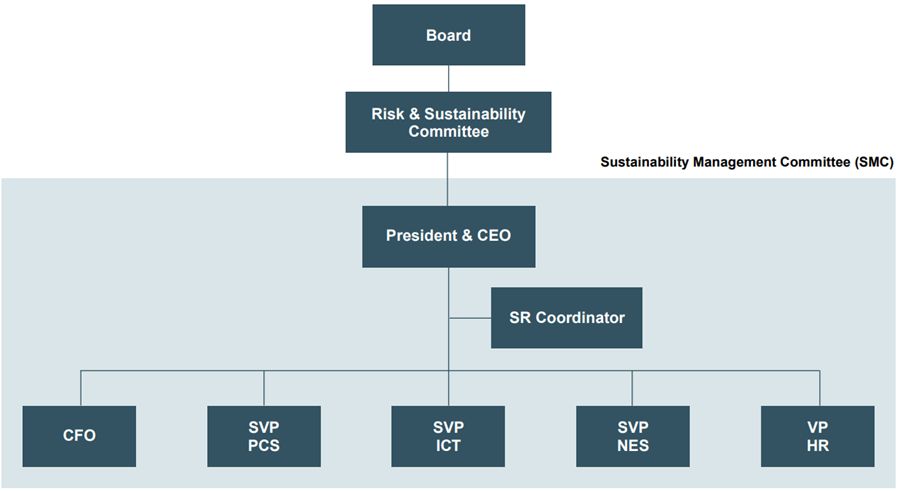
Business Code of Ethics
At TeleChoice, we strongly believe that the road to healthy, sustainable growth is by holding ourselves to high standards of business integrity and ethical conduct. We work in close compliance and adherence to SGX-ST’s listing requirements and all applicable laws in the regions which we operate in and hold ourselves accountable for our business conduct.
Our Business Code of Ethics addresses the expected responsible business conduct and behaviour for our employees to safeguard the interests and rights of all our stakeholders, including shareholders, customers, employees, industry partners, vendors and creditors. To guide our decisions and actions, we have established policies that have been reviewed and approved by the Management and/or the Board, covering areas from regulatory compliance, anti-corruption, fraud, information security, data protection, conflict of interest, human rights, including but not limited to labour, employee, supplier and creditor rights, and discrimination in any form.
During the year, our President & CEO and the Management convened a review on our Business Code of Ethics and our policies to benchmark against the Singapore Governance and Transparency Index’s (“SGTI”) corporate governance practices to enhance our processes and procedures, further strengthening our resolve of zero-tolerance towards any form of unethical behaviour.
All our policies are communicated to our employees during induction and annually through a combination of a mandatory town hall at the beginning of the year and through e-learning to ensure that all our employees are updated on the latest requirements. All these resources are readily accessible through the TeleChoice intranet. Our employees are encouraged to reach out to any policy owner(s) or HR if they have questions on the policies or to report on questionable behaviours or conduct through our whistleblowing protocols. Refer to pages 21-59 in the Corporate Governance section of this Annual Report, or on our website at https://telechoice.listedcompany.com/corporate.html for more information on our corporate governance framework.
Regulatory Compliance
Maintaining regulatory compliance is essential for upholding our legal and ethical obligations, protecting our reputation, and avoiding financial and legal consequences. It is crucial in establishing trust and credibility with our customers and stakeholders, while also preventing reputational damage and negative publicity.
At TeleChoice, we are committed to complying with all applicable laws and regulations. We have implemented necessary measures to comply with relevant regulations, such as data protection laws, sustainability reporting rules, environmental regulations, tax laws, and employment laws. We monitor our legal compliance performance and report incidents of non-compliance.
There were zero (0) incidents of non-compliance with laws and regulations during the current or immediate past reporting period.

Anti-Corruption Policy
Corruption undermines stakeholder trust and hampers economic and societal growth. As a principled business, TeleChoice is committed to maintaining the highest standards of ethics and integrity and maintains zero tolerance for any form of corruption, bribery, fraud or money laundering. We are committed to conducting our business activities in a manner that is fair, ethical, transparent, and accountable. Our anti-corruption policy applies to any act or suspected act of bribery or corruption involving employees, officers, directors, vendors, contractors, business partners of, and any other parties which have a business relationship with any company within the TeleChoice Group.
Our Anti-Corruption Policy outlines the standards and procedures which apply to our employees, directors, and third parties representing or working with us, including suppliers, contractors, business partners and stakeholders. This policy strictly prohibits the offering, giving, soliciting, or accepting of bribes or corrupt payments, either directly or indirectly, from any individual or organisation, for any purpose. Our policy requires prompt reporting and investigation of any suspicion of bribery or corruption, ensuring that appropriate measures are taken promptly. Our Audit/Risk & Sustainability Committee regularly reviews our policies to ensure that our business code of conduct is of the highest standards to prevent, detect and act against risks to our business integrity.
For all new employees, understanding and complying with our anti-corruption policy is a mandatory aspect of the onboarding process. This includes familiarisation with the policy, comprehending its implications, and completing an assessment to ensure thorough understanding.
Anti-Corruption Awareness
The Group’s anti-corruption policy is communicated to all employees, directors, and suppliers, through our annual engagement with employees. To further emphasise the Group’s zero-tolerance approach to corruption and bribery, we send an annual reminder to all employees, reinforcing the policy’s expectations. All TeleChoice employees are required to electronically acknowledge or sign a Declaration Form to declare their acknowledgement of, and compliance with, our anti-corruption policy.
Vendor Assessment & Selection
To ensure that we deliver the highest product and service quality standards to our customers, we assess our business partners and vendors for their alignment to these standards. These standards and assessment criteria include the analysis on their supply and value chain, process, practices, certifications, competency, track record, product and service quality, transparency, and their ability to comply with work and legal requirements. By upholding these standards, we strengthen our commitment to excellence and reliability.
Creditor & Vendor Rights
As a service provider, our business partners, vendors and suppliers are just as critical to our sustainable development. We select and rely on our strategic business partners for quality products and services, so that they meet the needs and expectations of our customers. Recognising their integral role in our operations, we seek to build long, trusting relationships with our business partners, vendors and suppliers, by upholding their rights and agreements with us. We have measures in place to ensure transparency and fairness in our financial dealings. Our financial statements are prepared in accordance with the Singapore Financial Reporting Standards (International) (“SFRS(I)”), providing clear and accurate representation of our financial position. This ensures that creditors and vendors have access to reliable information. We comply with the requirements under SGX Listing Rule 1207 and provide annual reports that contain comprehensive information on our financial performance. By maintaining these high standards of corporate governance, we safeguard the interests of our creditors and vendors, preserving and building the trust we have with our business partners and stakeholders.
Information Security & Data-Protection
Information security and personal data protection are critical in this digital age. Data breaches can severely undermine trust, cause significant reputational and financial harm. We are committed to safeguarding the personal data entrusted to us, ensuring compliance with relevant data protection and privacy regulations.
Aligned with the Personal Data Protection Act (PDPA) in Singapore, which regulates the collection, use, and disclosure of personal data by organisations, we have established a Personal Data Protection Policy. This policy is available publicly on our corporate website. In accordance with this policy, we have put in place measures to secure the personal information of our employees, customers, suppliers, business partners and other stakeholders. We have also designated Data Protection Officers (“DPOs”) at the Group level and for each of the business divisions. Stakeholders can contact our DPOs via mail, email, or phone for any queries or concerns regarding their personal data. NxGen Communications has been ISO27001 certified in cybersecurity since 2023, to ensure high standards in cybersecurity and data protection.
We constantly monitor our information security systems and aim to have zero incidents of personal data breaches. In 2024, there were zero (0) complaints concerning breaches of customer privacy, theft, leaks, or losses of personal data or critical information.
Conflict of Interest
Our Conflict-of-Interest policy requires relevant employees to sign an annual Declaration of Interest and Undertaking. This applies to employees of TeleChoice International Limited and its subsidiaries, especially those who have access to sensitive information and/or are in a position to influence decisions in sales/marketing and purchasing activities. In addition, immediate disclosures must be made if circumstances exist that could prevent the employee from discharging his/her duties in a professional and objective manner.
Human Rights
At TeleChoice, we are committed to upholding internationally recognised human rights principles and agreements, including the UN Declaration of Human Rights, the International Labour Organization’s (“ILO”) core labour standards, and relevant national laws.
We have a zero-tolerance policy towards child labour and forced labour in our operations and supply chains. Our policies promote a culture of equality and inclusiveness, ensuring fair treatment and equal opportunities for all our employees and stakeholders. We respect the rights to freedom of association and collective bargaining and integrate human rights considerations into relevant policies and business practices. In this reporting period, there were zero (0) incidents of discrimination, forced labour or child labour.
Sustainability at TeleChoice
TeleChoice is committed to creating a positive impact on the environment, people, and communities while also delivering value to customers and shareholders.
In our Mission to be the Leading Provider of Infocomm Solutions through Innovative Products and Services our approach to sustainable development is guided by our corporate values of Integrity, Commitment, Excellence, Value Creation, being Socially Responsible and Fun@Work to tackling ESG issues.
As a leading regional provider of telecommunications products and services, we specialise in distribution, fulfilment, and retail managed services for telecommunication companies and major mobile device manufacturers. Our primary role involves facilitating connections between our clients and their consumers via the retail outlets that we operate. We also provide ICT and network engineering solutions to various industries and regions. The success of our business model hinges on fulfilling the service delivery expectations of our telecom partners and mobile device manufacturers, while maintaining high service standards for their consumers. Our people are crucial in ensuring that these objectives are achieved, thus making them our most valuable asset.
We acknowledge the significance of sustainability in our operations, value chain, and the broader community and are committed to maintaining high standards of governance and ethics. This involves serving our customers with integrity, reducing our environmental footprint, fostering a fair and inclusive workplace, and aligning our business practices with our corporate values and sustainability principles. Our goal is to positively impact our environment, people, and communities while delivering value to all our stakeholders.
Material ESG Topics
Within the context of our business, we identify and prioritise significant ESG impacts, risks, and opportunities. To track and report against our targets, we adhere to international sustainability reporting standards, such as the GRI Standards. Additionally, we align these topics with the United Nations Sustainable Development Goals (“SDGs”), demonstrating our contribution to sustainable development.
Our Sustainability Approach
Our approach to sustainability issues is rooted in good governance and focuses on addressing material ESG impacts, risks, and opportunities to build long-term business resilience and deliver value to our stakeholders and shareholders.
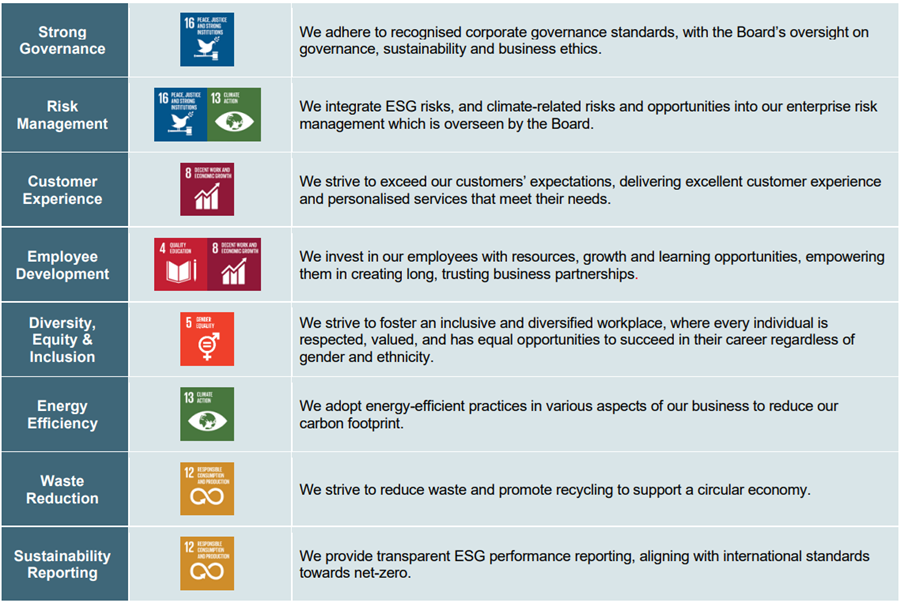
Our Sustainability Policy
Recognising the importance of sustainability in today’s business landscape, our President & CEO of the TeleChoice Group has approved a Sustainability Policy as part of our commitment to operate in an environmentally, socially, and economically responsible manner. To contribute positively to the society as a good corporate citizen while minimising our environmental footprint, we collaborate closely with our business partners, suppliers, vendors, to promote high sustainability practices and responsible sourcing.
The following commitments are part of our sustainability policy:
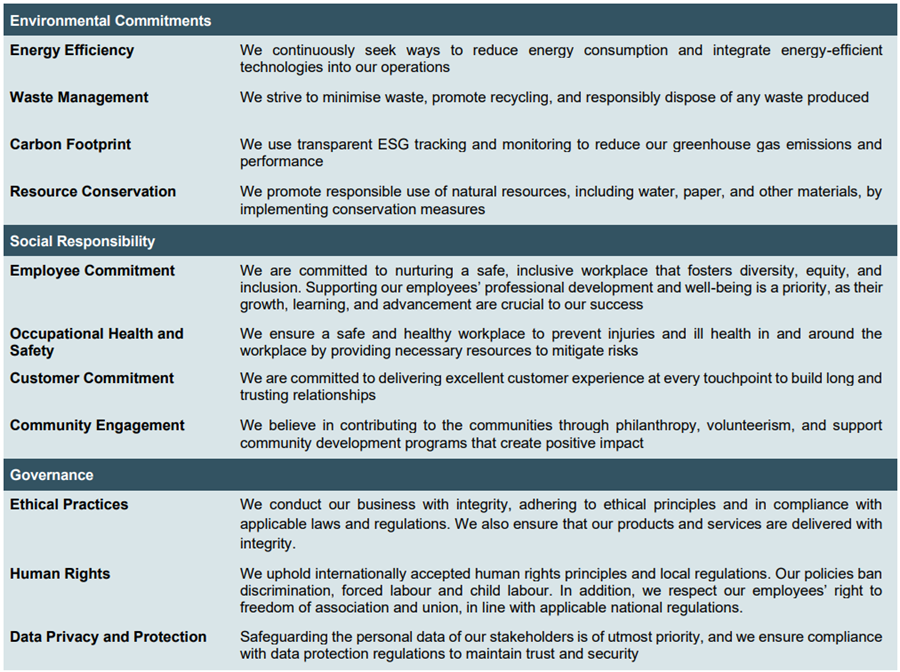
Materiality Assessment
At TeleChoice, we are committed to operating with integrity in a sustainable and responsible way, ensuring value creation for our stakeholders and shareholders. Our strategy involves identifying and addressing key sustainability issues that are significant to our business and stakeholders in the short, medium, and long term. We regularly review and assess our material ESG issues to ensure they stay relevant to our business and stakeholders.
Determining Material ESG Topics
Our last materiality assessment was conducted in FY2023, involving the senior management team, comprising business leaders from each business division with the subject matter expertise to evaluate our actual and potential ESG impacts, risks and opportunities. The assessment was conducted in accordance with GRI’s list of topics and GRI’s 4-step materiality assessment process, as illustrated below. Topics examined were from human rights, environment and economy, as part of our commitment to further strengthen our goals and alignment to UN Sustainable Development Goals (SDGs) and the GRI 2021 Standards. In FY2024, the Management determined that the assessments conducted in FY2023 are still relevant.
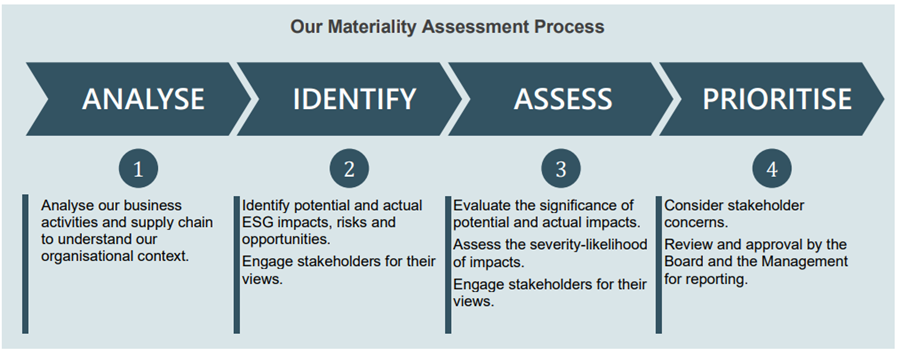
Review and Approval
The SMC supports the RSC and the Board in reviewing and approving our material ESG topics. The SMC conducts detailed reviews of these factors, considering the Group’s actual and potential operational impact, industry challenges, regulatory landscape with key stakeholders. These reviews ensure alignment with the Group’s fundamental values and long-term objectives in the ICT, network engineering and retail industry. The final review and approval rest with the Board with support from the RSC.
Material ESG Factors
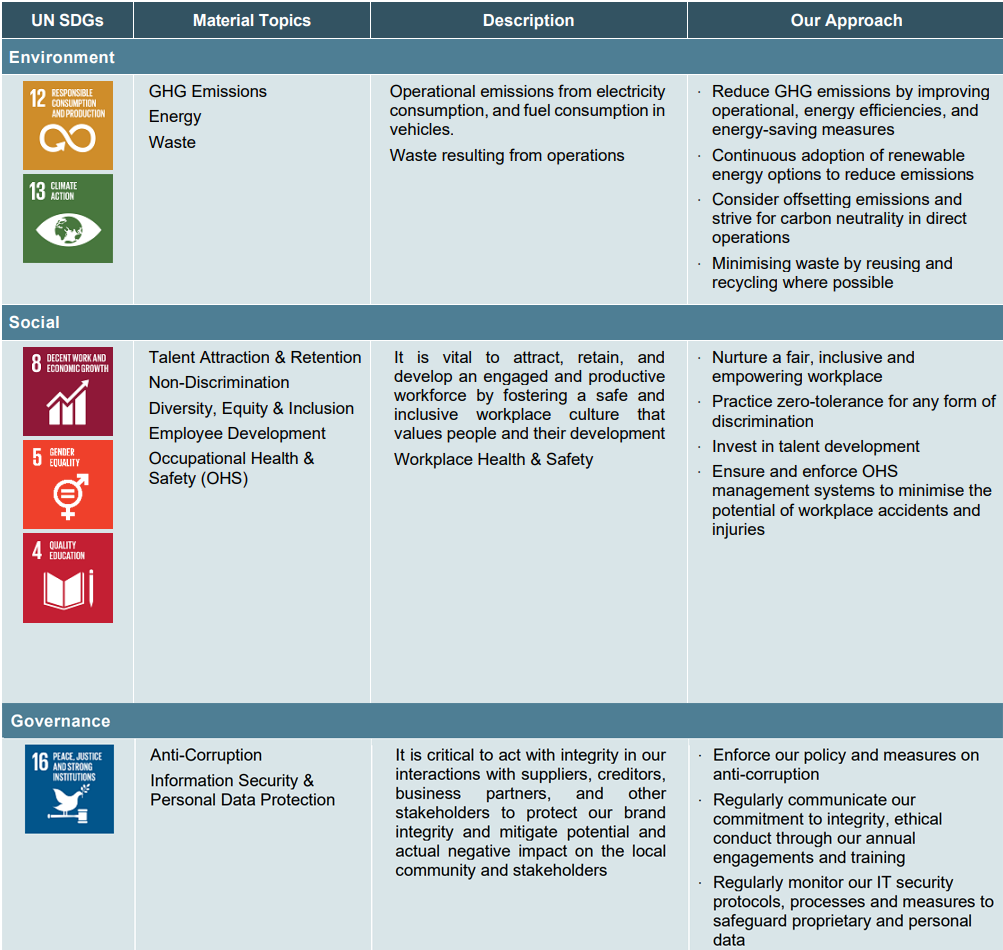
Sustainability Goals & Targets
As part of our commitment to sustainability to reduce our GHG emissions as a corporate citizen, we have established FY2022 as our baseline year to track our sustainability performance. We aim to reduce our Scope 1 and 2 GHG emissions by 50% by 2030 in alignment with the Singapore Green Plan, and net-zero by 2050 towards global objectives established in the Paris Agreement. Commencing FY2024, we target to reduce our Scope 2 emissions by 3% annually from our baseline year. For metrics and targets set for material ESG topics across short, medium and long term horizons, short term refers to the next 1 to 2 years, medium terms refer to 3 to 4 years, and long term refers to 5 years and beyond, unless explicitly stated.
In our aspiration to achieve these goals and targets, we strive to further integrate sustainable practices into our business operations, by sourcing and integrating low-carbon solutions, improving efficiencies, and adopting more green technologies, contributing to a sustainable and resilient future.
Stakeholder Engagement
TeleChoice engages with key stakeholders through various channels to ensure sustainability in our value creation, based on their actual and potential impact on our business and us on them. Maintaining these regular engagements is essential in identifying with our sustainability performance, and in addressing their needs, expectations and concerns. More importantly to us, it is crucial for establishing trust, the foundation of strong, lasting relationships.
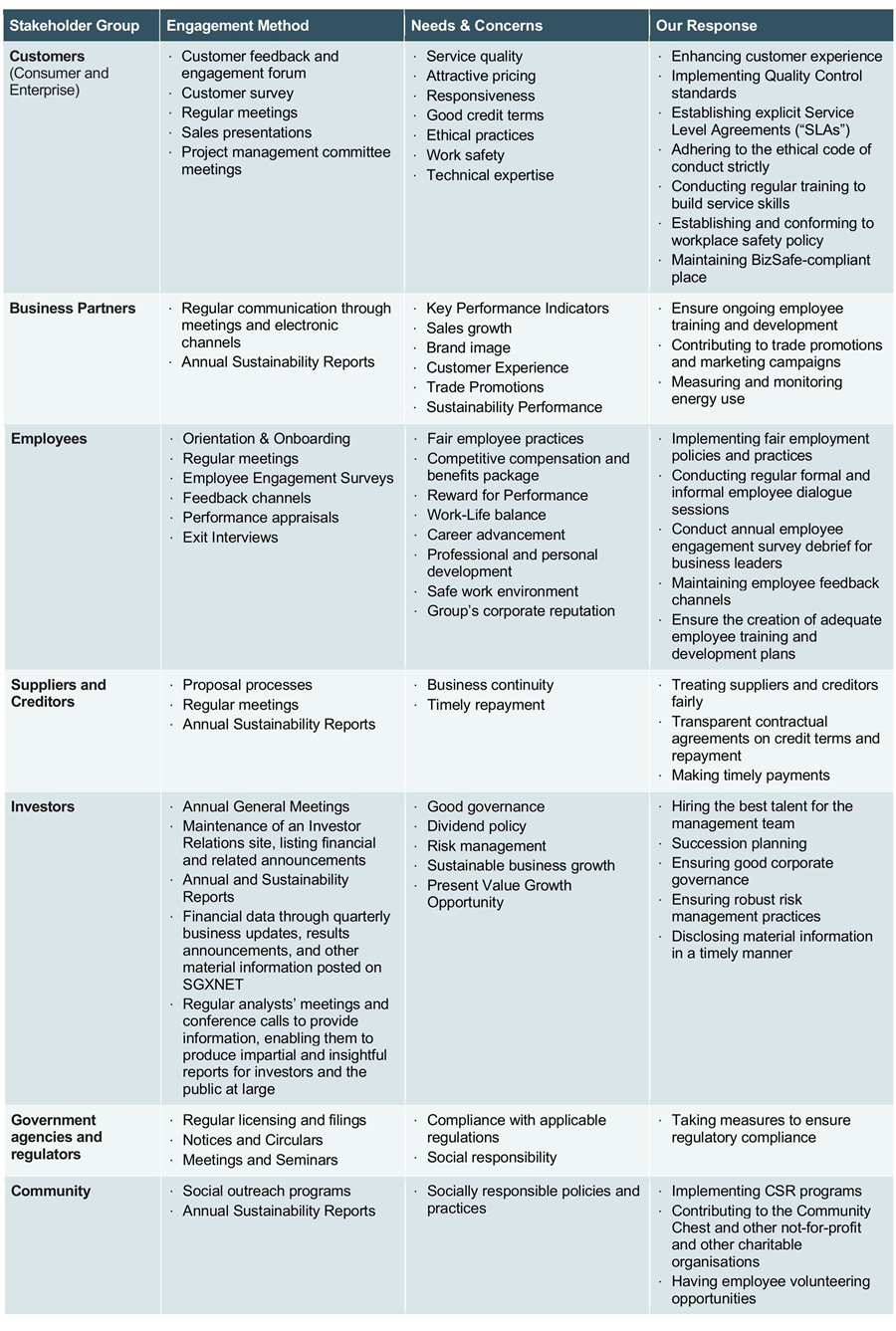
Customers
TeleChoice is committed to ensuring excellent customer experience by adopting a customer-centric business approach.
At TeleChoice, we understand that delivering on exceptional customer service is key to gaining a competitive edge and fostering relationships built on trust, transparency, and respect. We aspire to be the preferred business partner of choice, trusted by our customers and clients for our consistently high quality of products and customer experience.
Customer Experience
As our enterprise and consumer customers rely on us for ICT, mobile device distribution, retail managed services and network engineering solutions, our focus on optimising customer experience is vital. We frequently engage our customers for feedback to continually improve our capabilities and build trusting business partnerships.
Our employees play a pivotal role in driving and delivering excellent customer experience. We will continue to build our team based on merit and capabilities, so that our customers are served by qualified and experienced professionals. As the primary ambassadors of our brand, they are dedicated to high standards of service excellence and are empowered with autonomy to make informed decisions to resolve issues swiftly and efficiently, delivering exceptional service. This ensures satisfaction and fosters the building of long and trusting business relationships.
Customer Experience & Feedback
Collecting and analysing customer feedback is critical in our pursuit of service excellence. Leveraging on the latest technology, customers can share their experiences and thoughts with us by either replying to an automated SMS or scanning a QR code that will direct them to a dedicated feedback platform. Customers are thus able to voice their opinions to us easily and conveniently.
Customer feedback serves as a direct line of communication, providing us with insights critical in shaping and improving our products, solutions, services, and processes. By actively listening to our customers and incorporating their input into our decision-making, we can continuously evolve to meet and exceed their expectations. For our ICT Division, we have also recorded an average Customer Satisfaction and Net Promoter Score (“NPS”) Score of 70.12%. The sections below feature our customer satisfaction scorecard for our Consumer Division and extracts of testimonials received across our business divisions.

Testimonials
The following testimonials1 highlight key areas, providing valuable insights into our strengths and impact:
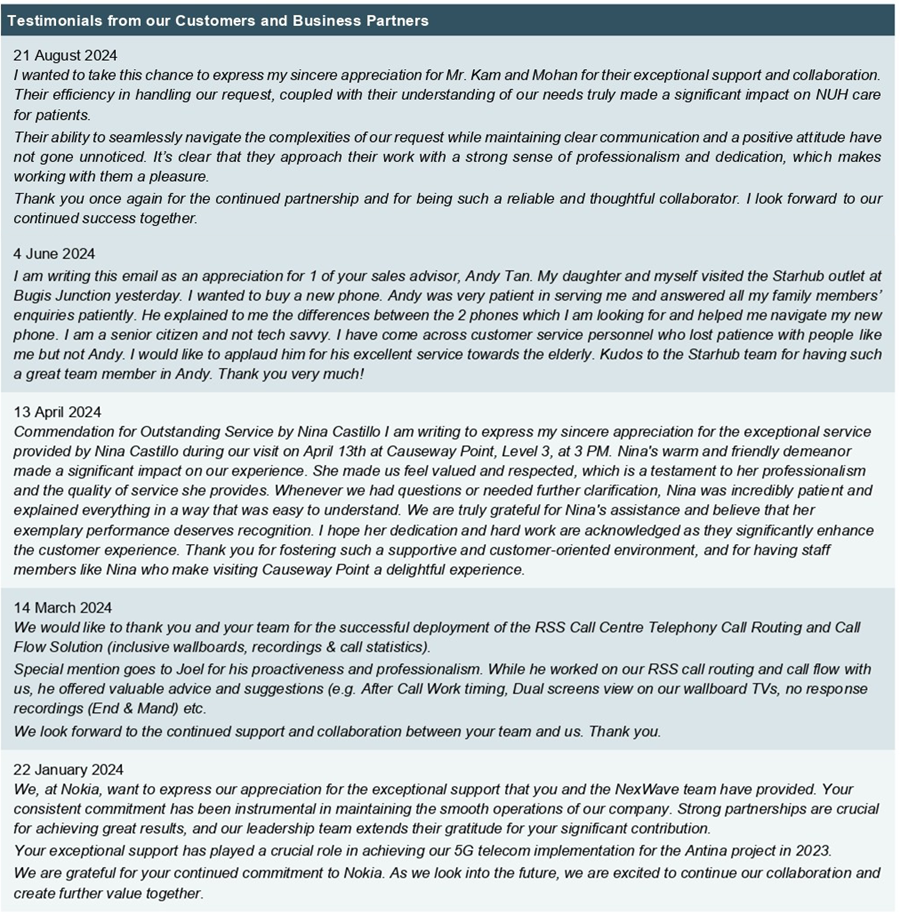
Footnote:
1. Extracted from letters and emails from customers and business partners.
Adoption of International Quality Standards
We believe that excellence is achieved by following high and stringent industry quality standards. Our subsidiaries NexWave Technologies Pte Ltd, NxGen Asia Pte. Ltd., and NxGen Communications Pte. Ltd. are certified under the ISO9001:2015 Quality Management Systems, demonstrating our dedication to excellence and continuous improvement of our processes to reach high levels of performance and quality standards.
Employee Recognition for Service Quality
We recognise and reward our employees for their outstanding customer service quality through incentive programs, using Net Promoter Score (“NPS”). Our NES Division launched the WINNER (Winning attitude, Integrity, Never give up, Nurturing, Excellence and Respect) Awards to employees demonstrating exceptional WINNER attributes. The ICT Division’s SPOT award aims to recognise and reward employees who had gone the extra mile to support our enterprise clients and gave them great customer experience.
Customer Health & Safety
Our customers and clients are at the centre of our business, and the safeguard of their health and safety is our utmost priority. Our OHS Management System ensures that our working environment, including retail stores, worksites, has been assessed, and inspected, with control options put in place by our Risk Assessment Leaders, and are in compliance with relevant WSH and legal requirements. As part of our internal OHS protocol, after the initial inspection, our worksite, retail spaces and areas where our customers, employees and stakeholder transact undergo another round of inspection to ensure safety. For more details on our OHS Management Systems, please refer to pages 83-84 this report.
People
TeleChoice is committed to providing a safe, inclusive and supportive workplace.
People are our greatest asset. Our team members play a vital role and are the driving force behind our long-term success. Therefore, attracting, engaging, developing and retaining the best talents is crucial for us. Recognising this we focus on providing opportunities for growth, a safe and engaging work environment, ensuring job satisfaction and personal fulfillment.
Our Employees
In this reporting period, our Singapore and Malaysia operations have a total of 477 employees. 85.5% were permanent staff, 13.6% were on fixed-term contracts, and 0.8% were temporary employees. There were zero (0) part-time employees in the reported period.

Promoting Diversity, Equity and Inclusion (DE&I)
Organisations with higher levels of DE&I are positively correlated with increased employee engagement, which in turn drives innovation and productivity. TeleChoice aims to cultivate a diverse, inclusive workplace that values and respects people from various backgrounds, experiences, and perspectives.
Guided by our Non-Discrimination, Diversity, and Equal Opportunity Policy, we treat all our employees fairly by strictly following a system of meritocracy that is based on performance and job outcomes. This practice extends to all of our talent management practices from recruitment, performance management, remuneration, rewards, recognition, training development, and career advancement decisions.
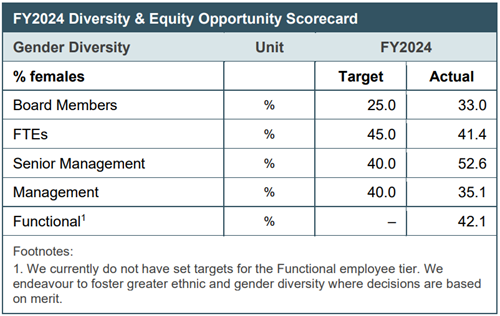
We protect our employees from discrimination in any form, and the spirit behind our people practices and decisions, such as hiring, and promoting from within, is about giving equal opportunities irrespective of gender or ethnicity. At TeleChoice, we believe all personnelrelated decisions are based purely on merit and a strong principle of meritocracy. We will continue that focus and no hiring or promotion will be based on diversity, equity and inclusion.
We also ensure that women are well-represented across all levels in the company and that our policies foster gender equality and inclusion. In our workforce, females constitute 41.4% of all full-time employees (FTEs), with 52.6% in Senior Management and 35.1% in the Management tier. Our current President and CEO is also a female, underscoring our commitment to gender diversity in leadership roles. Our team is enriched by a mix of 9 nationalities of various age groups, reflecting our commitment to multiculturalism.

High-performing work cultures are built on the foundation of fairness, equity and meritocracy. While female representation in management roles fell short by 4.9%, 35.1% against our 40% target, we remain steadfast in cultivating inclusiveness, equity by ensuring all employee irrespective of gender or ethnicity have equal access to training and leadership development. We will continue to work towards a more balanced leadership representation, prioritising career advancement based on merit, skill and achievement.
Talent Attraction & Retention
In this reporting period, our talent pool has been strengthened with 170 new employees, with females accounting for 43.5%, 7.7% were 50 and above, and 34.1% were under the age of 30.
We have established the FY2024 turnover target of ≤25%, which we will further endeavour to bring it to ≤20% and ≤15% for the mid to long2 term.
This FY, our turnover was 184 employees, with a turnover rate of 37.7%. Of the 184 employees, 55.4% were males, with 44.6% females. The higher turnover rate against target was due to higher-than-expected number of resignations in both our Consumer and ICT Divisions.
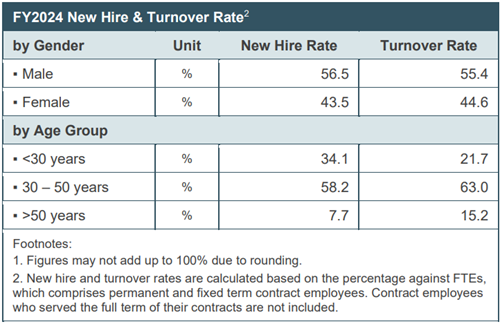

Ensuring Fair Treatment
A workplace environment that treats employees fairly and rewards based on performance contributes to employees’ mental wellbeing. In Singapore, we have signed the Employer’s Pledge under Tripartite Alliance for Fair & Progressive Employment Practices (TAFEP) to reinforce our advocacy in Fair Employment Practices and ensure that our employees are treated with respect and dignity.
Our HR has strict policies on discrimination and harassment in the workplace. Our Non-discrimination, Diversity, and Equal Opportunity Policy prohibits all forms of discrimination based on race, nationality, ethnicity, religion, gender, age, marital status, disability, sexual orientation, or any other protected characteristic.
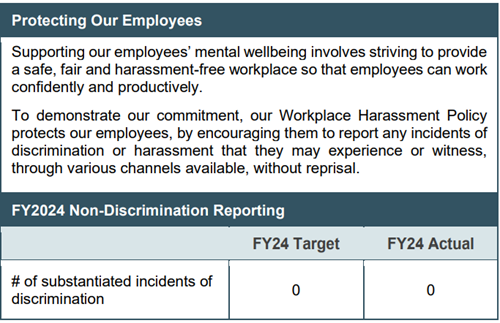
Employee Experience & Engagement
Engaged employees are not only more productive, and they also contribute significantly to a positive work environment. To foster a culture that promotes engagement, we constantly strive to ensure that we create a positive working environment by offering competitive compensation and benefits, providing growth and development opportunities, recognising, rewarding our top talents well and having strong, trusting relationships. It is also our priority to promote safe, open lines of communication across all levels to facilitate constructive dialogue and discussions towards better employee experience.
Employee Healthcare & Wellbeing
Health is an integral part of our employee’s wellbeing. At TeleChoice, we take responsibility for supporting both the physical and mental wellbeing of our team members. On top of our benefits package, we offer free on-site health screenings that detect early signs of health issues such as hypertension, heart ailments, diabetes, and cancer for our employees annually.
Employee Benefits
We offer competitive remuneration and benefits packages for our FTEs that commensurate with their job levels, responsibilities, and performance. Our FTEs are entitled to the following benefits:
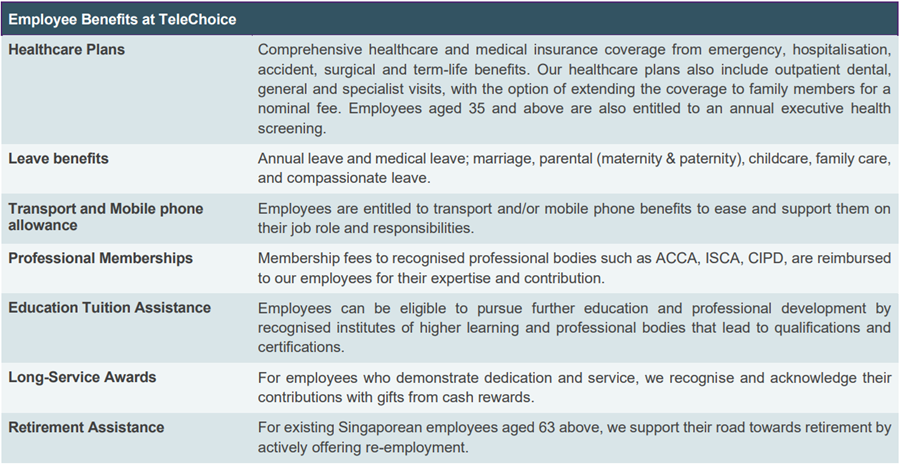
Our Team Culture
In TeleChoice, we place high value in creating a workplace culture characterised by mutual respect, trust, teamwork, and open communication. During the Lunar New Year, we celebrated by giving red packets or "hong bao" to our team members as a token of appreciation for their hard work.
On our 26th anniversary, we organized a “Kacang Puteh day”, where the Management served the employees their choice of snacks that had been popular back in the 80s. Our employees had to hunt at different parts of the office, participating in fun-filled games and activities put together by the HR department. The event, filled with a sense of nostalgia, allowed everyone to take their minds for a short respite, was aimed at creating stronger relationships between everyone. Each business division also has a budget for activities towards their team building and team bonding events.
We also observe early work releases on the eves of Singapore's four major public holidays, contributing to our employees' work-life balance and cultural engagement.
Measuring for Employee Experience
Through the corporate town hall in last quarter, we have designed and launched an employee engagement survey, seeking to measure various aspects of the employee experience. The dimensions included in this survey were leadership, empowerment, innovation, productivity, employee benefits, teamwork, motivation, wellbeing, satisfaction, and governance & compliance. The survey consisted of both graded and open questions, and employees could submit their responses with full anonymity, ensuring psychological safety so that their true voices could be heard.
The results of the survey have been shared with our President & CEO and the respective heads of each business division to facilitate our People strategy going forward. The results have also been shared with all the employees in a follow-up session. Led personally by our President & CEO, we held an open dialogue session where our employees could share their feedback, questions, concerns and requests anonymously through a cloud portal. Further discussions are underway with the respective business division leaders in implementing new People initiatives to enhance employee experience and engagement.
Supporting Work-life Balance
A healthy work-life balance is essential to employee well-being, and we recognise that beyond work, employees can face difficult and unexpected life challenges, be it illness, or caring for elderly parents. Understanding this, all employees in TeleChoice can request for Flexible Work Arrangements (“FWA”). This can be in the form of flexi-place, flexi-time, or flexi-load, where work can be re-designed to balance been business and employees’ personal needs. Employees are welcome to discuss this formally with their managers and the HR team in time of need to work out an arrangement that can work for both parties.
Occupational Health & Safety
It is our utmost priority to ensure the safety of our work environment for our employees, customers, vendors and stakeholders who might be impacted by our operations. We are committed to maintaining a safe and healthy work environment for our employees and any other stakeholders who might be impacted by our operations.
Our Occupational Health and Safety (“OHS”) Management System aligns with all applicable legal obligations and the ISO 45001, the international standard that provides requirements and guidance in creating safe and healthy workplaces. Our OHS System includes requirements and guidelines from risk identification, emergency preparedness, external provider controls, to the use of hand tools, stacker operation, work-at-height. This system enables us to identify potential hazards, evaluate the risks, and implement effective measures to control and manage these risks.
Our NES Division is BizSAFE STAR certified and have obtained certification for ISO 9001 in QMS and ISO 45001 in OHS Management Systems. NxGen Communications in our ICT Division is also BizSAFE 3 certified, demonstrating our steadfast commitment to the highest standards.
Contractor Management
Contractors engaged by us are required to comply with our OHS System, which will be communicated to them by our supervisors. Contractors will first be assessed on their relevant competencies and prior training before being selected as part of our contractor management process and risk assessment. Prior to the start of projects, they are required to attend our toolbox meetings to understand the risks and safety procedures before work commencement. We also mandate our contractors to provide the required health and accident insurance as part of legal compliance.
Our OHS Management System

Our OHS Management System establishes clear procedures and processes for hazard identification, risk assessment, and the determining of controls that are applicable to all our operations. This manual contains details on the roles and responsibilities of the Management team, HR, Risk Assessment (RA) Leader, Team Members, Safety Personnel and all employees. To ensure the safety of every employee, worker, and contractor, anyone can openly highlight their concerns, report on any potential OSH hazards or provide suggestions for improvements. The RA Leader shall lead the risk assessment and evaluation process, determining against the severitylikelihood assessment matrix and sets priorities, objectives, targets or implement operational control.
We are proud to have maintained a 0 (zero), accident-free record across all work-related injuries or illnesses since FY2022.
Safety Performance
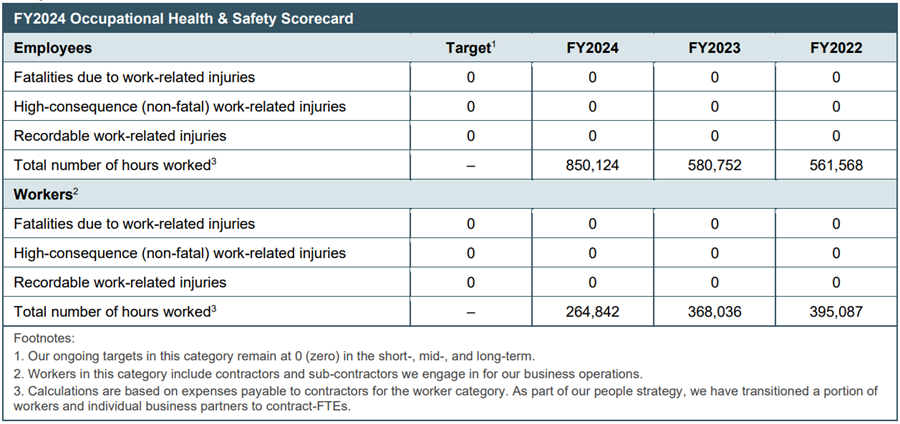
The key feature of our OHS Management System is the OHS Hierarchy of Control. Risk control options are Elimination, Substitution, Engineering Controls, Administrative Controls and Personal Protective Equipment (PPE), ranking from the most to least effective. In situations where additional controls have been implemented, a re-evaluation of severity-likelihood is performed. Our engineers are trained to always consider the most effective controls first. Audits and surveillance are conducted annually to identify gaps and improvements to our OHS Management System.
OHS Training
TeleChoice provides company-sponsored training to continually make improvements to our OHS Management System. These trainings include OSH-related skills and knowledge, including worksite supervision, safety management, emergency response and first-aid. In Q4 2024, our engineering team conducted a company-wide safety training and briefing on the importance of inventory management and use of PPE, with the key message that safety should never be compromised in favour of efficiency.
Respecting Employees’ Rights
We are committed to respecting our employees' rights to freedom of association and collective bargaining. We maintain a constructive partnership with the Singapore Industrial & Services Employees Union ("SISEU"), evidenced by a memorandum of understanding to uphold these rights. As of the end of 2024, we had 69 employees actively participating in SISEU.
Talent Development
The strength of our business lies in the success of our employees; their expertise, engagement, and growth drive our collective success. Our Human Resource OD & Learning mission is to enhance employee potential and performance through targeted training and aligning with TeleChoice's business goals. Our employees’ learning journey starts with an orientation program introducing them to TeleChoice and our corporate values. Thereafter, they are mentored by our business leaders through OJT programs, supported by various other formal and informal training opportunities such as live and virtual training, coaching, conferences and certification as part of our culture of continuous learning and improvement towards new challenges.
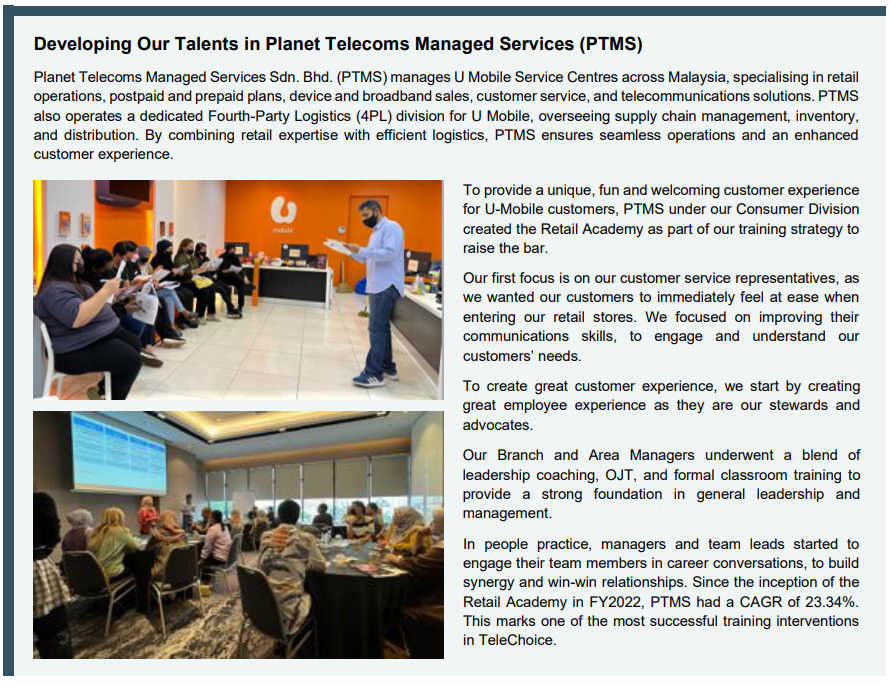
In 2024, TeleChoice championed its Sustainability 101 training for all new hires as part of their onboarding, using a blend of live and on-demand learning with quizzes to raise ESG awareness and advocacy.
During the year, we have also launched a new ISO27001 training program, to equip our employees on information and cybersecurity.

Talent Management
Recognising talent management as a vital strategy in achieving competitive advantage, we focus on retaining, developing, and managing top performers and high-potential employees. Our comprehensive Talent Management Framework encompasses a talent review process and succession planning overseen by our Talent Management Committee, headed by the President & CEO, Chief Financial Officer, Vice President of Human Resources, and heads of business divisions.
These employees are offered developmental opportunities such as training in new technical knowledge, leading special projects, managing teams, preparing them for bigger roles and responsibilities. This initiative ensures that there are capable individuals in the leadership pipeline, ready to advance into key positions.
Performance Management
We believe that achieving our business goals requires an agile approach to performance management. Our managers regularly engage their team members through coaching and mentoring to ensure their teams’ success. By assessing employee performance regularly, we can determine our employees’ professional and personal developmental needs, supporting them in their career growth. In 2024, 100% of the employees participated in the annual performance appraisal exercise.
Community
We strive to support local communities to play our part as responsible corporate citizens.
Prior to 2024, we focused on community development by aiding groups like the elderly and underprivileged hawkers. We have partnered with organisations including Dignity Kitchen, Dorcas, Lions Befrienders, MINDS Towner Gardens School, and Metta School, working with Community Chest's FUDAI and HeartStrings Walk programs. During our internal stakeholder engagement during the year, and with mental wellbeing as one of the trending topics, we are proud to have forged a partnership with the Institute of Mental Health (“IMH”) Singapore.
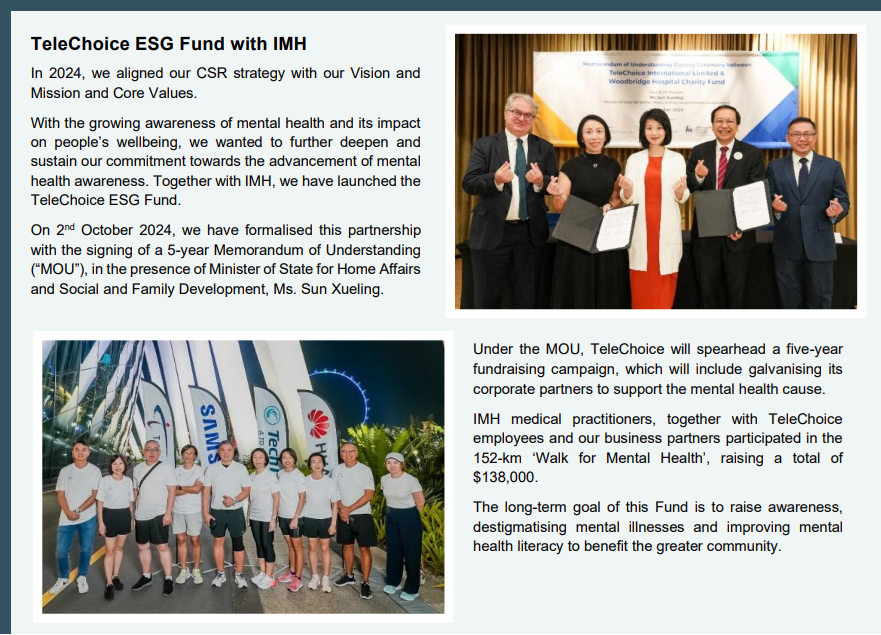

Environment
TeleChoice is committed to minimising the environmental impact of our business through resource efficiency and conservation.
We are committed to minimise the environmental footprint from our operations. Our main environmental impacts arise primarily from the use of electricity, fuel consumption, and operational waste. Our offices and retail outlets utilise electricity for lighting and air conditioning, while the vehicles we own for business operations rely on fuel. The majority of our waste originates from packaging in both our stores and warehouses. Our environmental strategies focus on improving energy efficiency, reducing waste, and enhancing recycling efforts.
We assess climate-related risks and opportunities and their potential financial impact on our business using the TCFD Recommendations as required by SGX Sustainability Reporting rules.
Climate Action
As a service provider, our operational GHG footprint is relatively small, but we are nevertheless committed to doing our part in mitigating climate change. Our GHG footprint is mainly from the electricity used in retail stores we manage for our clients and in our offices and the warehouse. In addition, GHG emissions arise from fuel consumption for the vehicles used in our operations.
Our climate policy commitment includes reducing our greenhouse gas emissions, promoting sustainable business practices, educating and engaging our employees.
Climate-Related Risk Management
Our Board holds responsibility for risk management, determining the nature and extent of significant risks our Company is prepared to take in pursuit of its strategic objectives and value creation. ESG risks, including climate-related risks and opportunities, are taken into consideration in our enterprise risk management and overseen by the Board.
Identifying Risks
Established by the Board in 2023, the RSC is responsible for assisting the Board in overseeing risk management and sustainability. The RSC is tasked with evaluating the Company's risk management framework, policies, and processes, identifies key risks, and offers guidance and recommendations to improve the Company's sustainability practices.
Our Group maintains a Board Assurance Framework, the Group’s enterprise risk management framework, guiding the identification, prioritisation, assessment, management, and monitoring of key financial, operational, compliance, IT, and any other material risks. These key risks are deliberated by Management and reported to the RSC. Central to the ERM is a Group-wide internal control system. With the introduction of the RSC, we aim to broaden the ERM’s scope to encompass climate-related and other ESG risks. This will include updating our risk register to include climate-related risks.
We have embarked on conducting climate scenario analysis (see Annex I) to inform our risk identification and develop appropriate strategies. We conduct materiality assessments regularly to determine key ESG issues, environmental risks and opportunities.
Managing Risks
The Board, advised by the RSC, sets our Group's risk tolerance and policies, while the RSC, together with the Audit Committee, oversees the design, implementation, and monitoring of risk management and internal control systems. The Board and RSC are supported by the Management and independent professional service providers, such as external and internal auditors, to ensure the adequacy and effectiveness of the Group’s risk management and internal controls.
As part of this process, the Management identifies key risk factors in our business and operations, categorises them according to financial, operational, compliance, IT, and climate-related risks, and ranks them by importance, likelihood, and potential impact. It then implements internal controls and other mitigating practices. The risk management framework is reviewed, considered, and approved by the RSC at least twice a year and as needed.
Under the RSC's supervision, the Management is responsible for effectively implementing risk management strategies, policies, and processes based on the framework to support the achievement of business plans and goals. Key risks, mitigating measures, and management actions are continually identified, reviewed, and monitored by the Management.
We understand that climate-related risks may pose significant challenges to our business and that of our business partners and customers. These risks are among the main global concerns that could affect our revenue, operations, supply chain, engagement with stakeholders, and communication with investors. Besides physical risks, we might face stricter emission standards, more comprehensive emissions reporting, and higher carbon taxes due to regulatory changes. Considering these risks, reducing our carbon footprint, preparing for the impact on our business partners and customers, and taking advantage of new opportunities arising from the shift towards a low-carbon economy are crucial for our medium-to-long-term business strategy. Therefore, we are committed to enhancing our focus on ESG communication and climate reporting to effectively manage the expectations of our stakeholders.
Understand more on our Risk Management process in the Corporate Governance section by referring to Principle 9 on page 47 of this report.
GHG Emissions & Reduction Targets
To work towards reducing our carbon footprint and our goal of reducing our Scope 1 and Scope 2 emissions by 50% in 2030, we aim to reduce our emissions by 3% annually in the short term. In the medium term, we plan to invest more in green technologies to achieve greater efficiencies and continue to build our capabilities to take on bolder strategies to accelerate the decarbonisation of our business operations.
For this year’s reporting, we have taken further steps to further our commitment towards sustainability. To track our sustainability performance and to align to the Singapore Green Plan, we have established FY2022 as our baseline year. On top of Singapore, we have also broadened our reporting boundary to include our regional offices in Malaysia for this reporting period in this report. We also have plans to further broaden the reporting boundary to include other countries in the near future.
Our source of greenhouse gas (GHG) emissions comes primarily from electricity usage in our stores and offices, as well as fuel consumption by our company-owned vehicles.
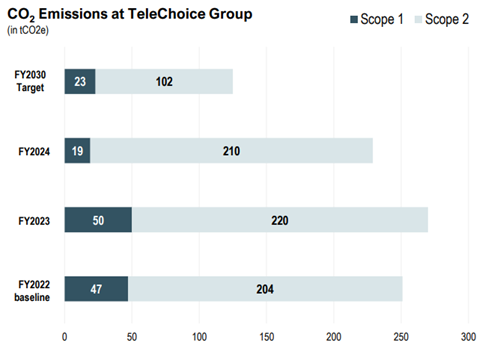
For FY2024, Scope 1 accounts for 8.3% while Scope 2 accounts for 91.7% of our total emissions for FY2024.
Our total Scope 1 & 2 GHG emissions have been reduced by 8.8%, Scope 1 by 59.6%, Scope 2 by 2.9% and emissions intensity by 61.0%, compared to the baseline year.
In our commitment to sustainability, the company reviewed our fleet strategy and decided to decommission close to half of our vehicles. These efforts have significantly contributed to our reduction in Scope 1 emissions.
Moving forward as we plan our decarbonisation roadmap; we seek to implement new methods and processes to reduce our Scope 2 emissions.

Energy Management
We track and assess our energy consumption and strive to improve energy efficiency in our operations. In 2024, our electricity consumption was 509.72 MWh, a 4.1% increase from the baseline year. However, our electricity intensity was reduced to .051 MWh per sqm, a 55.7% reduction against the baseline year. This was primarily due to our Consumer Division and N-Wave Technologies Sdn. Bhd. (N-Wave) moving to more energy efficient spaces, which resulted in a reduction of 48.6% and 54.7% MWh per sqm respectively in electricity intensity compared to FY2023.

Waste Management
TeleChoice has two general categories of waste. General waste comes primarily from retail and warehousing operations, which include paper, plastic, and wooden pallets. Electronic waste, or e-waste, consists of decommissioned IT & ICT equipment like communications equipment, notebooks, monitors, and servers. Mobile handset decommissioning and disposal are managed by our business partners and retailers. Our waste is managed by licensed recyclers who collect and sort the recyclable materials before disposing of the rest.
In this reporting period, we have registered 8.97 tons of general waste and 1.26 tons of e-waste from our business operations. The general waste came primarily from our warehousing operations and from the move from Toh Guan to the Pandan Crescent location; 6.93 tons of paper and 0.15 tons of plastics were diverted to recycling, with the remaining 1.89 tons for disposal. From our ICT Division, 1.26 tons of communications equipment such as switches and network phones were sent to our licensed e-waste vendor for recycling, salvage and disposal. The actual quantity of material recycled and salvaged was undisclosed, hence, all 1.26 tons of e-waste are treated as disposed. Moving forward, we will work more closely with our business partners for greater levels of transparency in the recycling-disposal process.
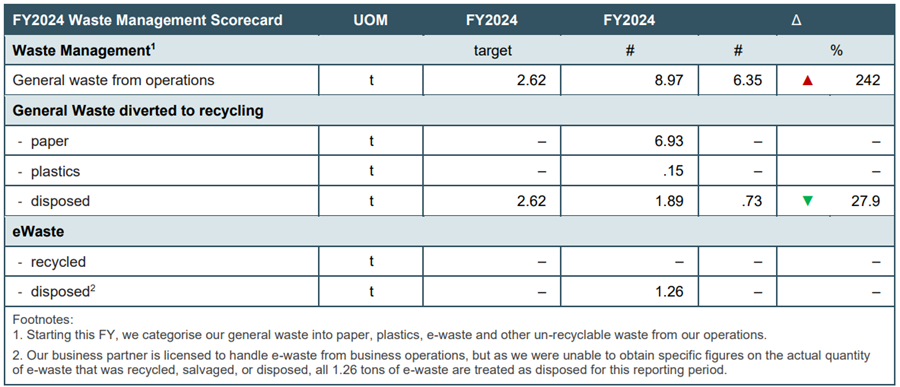
Our Next Steps
We are committed to continuing to build our knowledge and understanding of climate-related risks and opportunities and their potential financial impacts on TeleChoice. Our next steps are summarised below:
- Conduct further scenario analysis by selecting two scenarios, one of which is consistent with a future well below 2°C, for a more detailed assessment of the potential physical risks and transition opportunities for our business
- Continue to enhance climate understanding at the Board and Management levels by implementing ESG and climate-related training.
- Integrate climate risk assessment and management into the Group Enterprise Risk Management Framework
- Develop a roadmap towards net-zero.
- Engage business partners and customers on climate-related risks and opportunities.
Annex I - TCFD Report – Scenario Analysis
Climate-Related Strategy over the Short, Medium and Long Term
Short Term
We anticipate enhanced regulatory requirements and stakeholder expectations for comprehensive reporting of GHG emissions. Our nearterm strategy is to map out and report on our GHG emissions across our business divisions, using the Greenhouse Gas (GHG) Protocol. We currently report our Scope 1 and 2 GHG emissions in our sustainability reports. We have also committed ourselves to halve our Scope 1 and 2 emissions by 2030, aligning ourselves with the Singapore Green Plan and towards net-zero by 2050. The next course of action for TeleChoice Group is to analyse business processes to determine areas of opportunities and quick wins to improve operational and energy efficiency, while reducing our emissions to 50% from our baseline year of FY2022.
Medium Term
We will explore advanced decarbonisation strategies to reduce our operational emissions. Given that our location-based Scope 2 emissions account for 91.7% of our combined Scope 1 and 2 emissions, we are assessing options to transition to renewable energy sources. Our Scope 1 emissions currently account for 8.3% of our total Scope 1 and 2 emissions and originate primarily from our service vehicles. We will continue evaluating the feasibility of transitioning to electric or hybrid vehicles.
Long Term
Our long-term strategy would be to attempt to achieve net-zero emissions for our direct operations and work with like-minded.
Scenario Analysis
We have considered Shared Socioeconomic Pathways (“SSP”) based climate scenarios from the Intergovernmental Panel on Climate Change’s (“IPCC”) Sixth Assessment Report (“AR6”) and the corresponding Representative Concentration Pathways (“RCP”) scenarios from the IPCC’s fifth Assessment Report (“AR5”) for a qualitative analysis to develop our understanding about the potential impact of climate change over the short term, medium and long term on our business.
SSPs depict shifts in factors such as population, economic growth, education, urbanisation, and technological advancement that could influence future greenhouse gas emissions, offering narratives of potential pathways to various levels of warming. These are closely linked with RCPs, the scenarios utilised in AR5, which focus solely on atmospheric greenhouse gas concentrations. Together, SSPs and RCPs offer a more comprehensive understanding of possible future scenarios.
SSP Scenario Narratives
The SSPs provide a narrative of how the world could reach certain levels of warming, and outline how shifts in population, economy, education, urbanisation, and technology could impact greenhouse gas emissions and influence global warming levels, with corresponding RCPs detailed below.
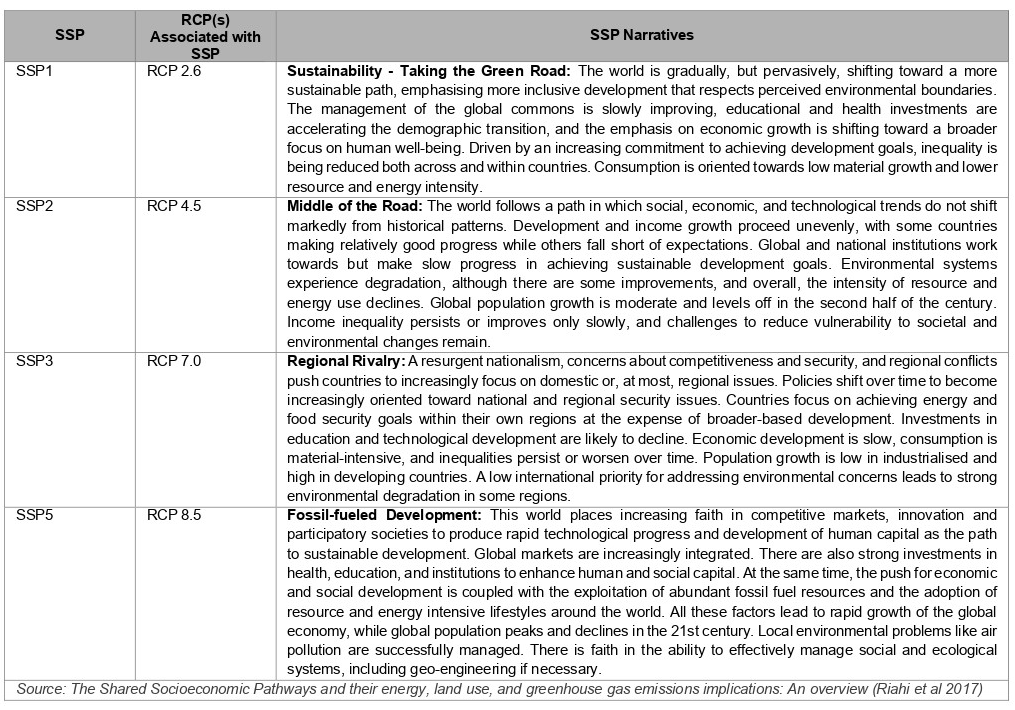
We have referenced the following five SSP climate scenarios from the IPCC AR6 for our qualitative analysis:

Climate-related Risks and Opportunities
Based on the initial qualitative scenario analysis, an overview of our potential financial impacts of climate-related risks and opportunities is presented below.
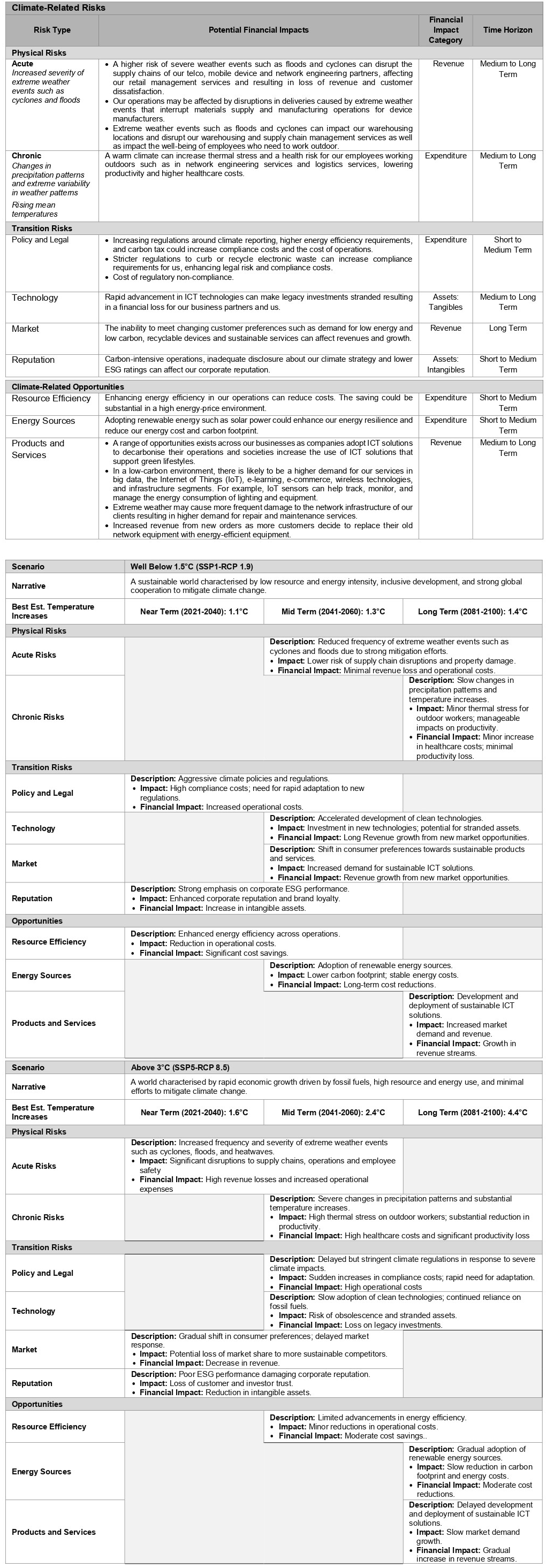
Annex II – TCFD Disclosures
This report is aligned with the Task Force on Climate-Related Financial Disclosures (TCFD) recommendations. The following table indicates our TCFD disclosures.
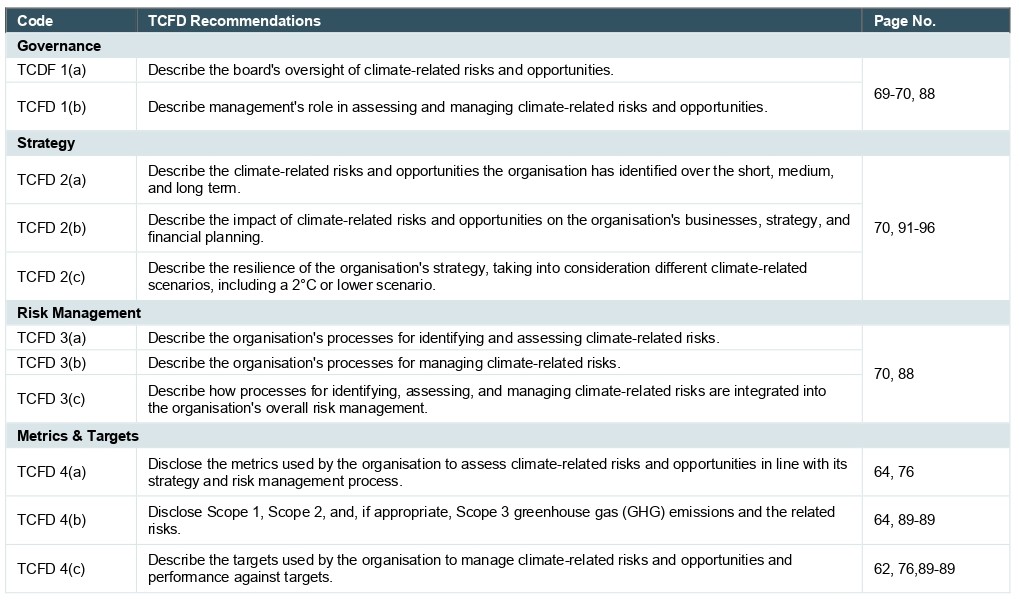
Annex III - GRI Content Index
